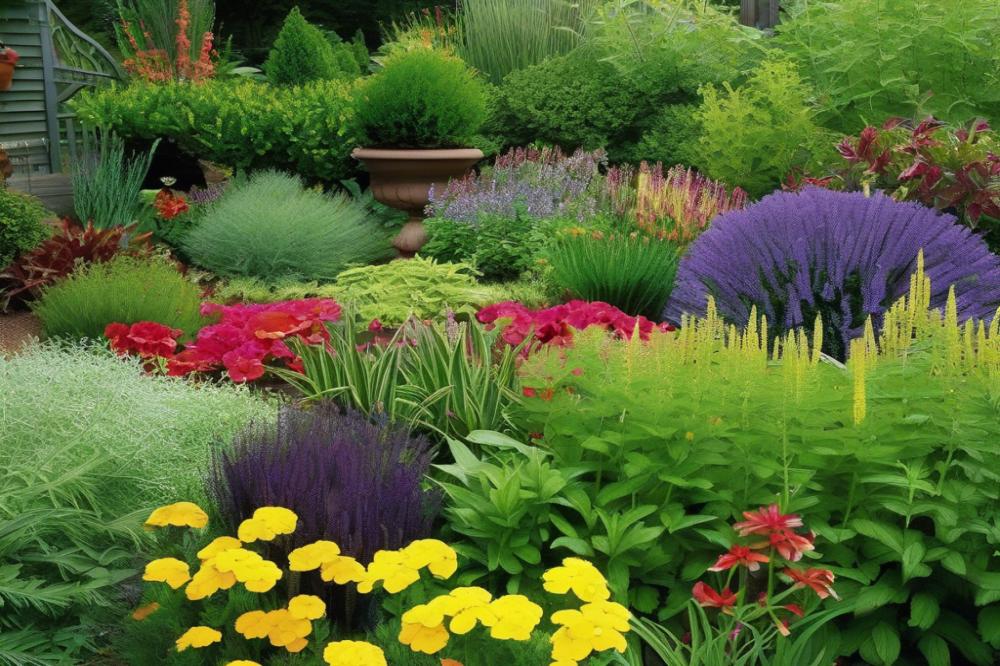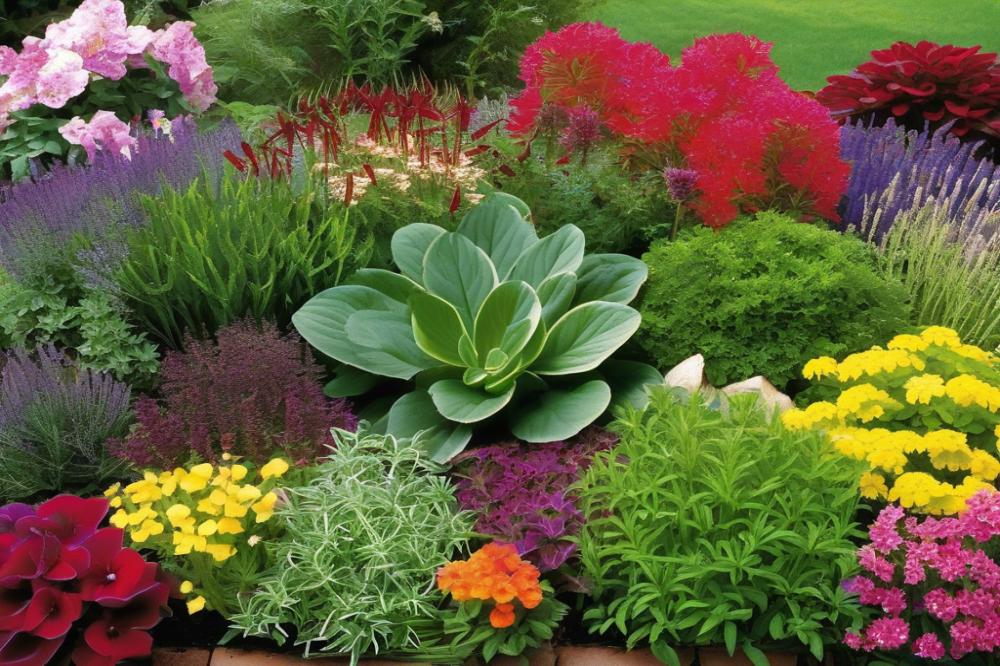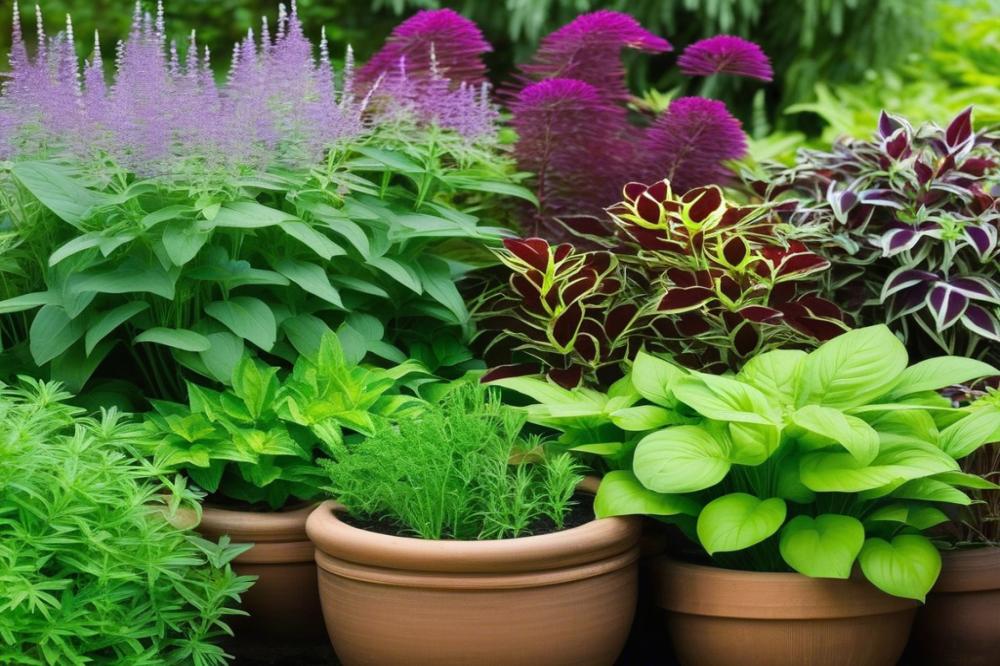Growing Rare and exotic herbs in Your Garden
herb gardens have captured the interest of many in recent years. Their charm lies not only in their beauty but also in the vast array of flavors and scents they can bring to a home. People are increasingly drawn to rare and exotic herbs for both culinary and medicinal purposes. These plants offer a chance to explore new tastes and aromas that can elevate everyday dishes and provide health benefits.
Gaining knowledge about herb cultivation opens up a world of possibilities. The variety of plant species available today means that you can create a unique herb garden tailored to your tastes. gardening tips from experienced growers can guide you in selecting the right options for your space. This includes understanding the best growing techniques, such as how to optimize sunlight and water for various plant varieties.
What makes these herbs especially appealing is their potential to enhance flavors in everyday meals. Imagine stirring fresh mint into a homemade tea or adding vibrant purple basil to a salad. Recipes that highlight these ingredients can transform simple dishes into extraordinary culinary experiences. Each herb contributes its distinct note, creating a symphony of taste.
Engaging in sustainable gardening practices is another significant benefit of growing these beautiful plants. Home gardens reduce carbon footprints by allowing you to grow your herbs instead of relying on store-bought options, which often come with excess packaging. Additionally, cultivating these plants promotes biodiversity, providing a friendly habitat for beneficial insects.
Planning your garden thoughtfully is crucial for success. Seasonal changes and local climate may affect the growth of certain herbs. Selecting the right location in your yard can maximize sunlight and airflow, leading to healthier plants. The planning process involves researching which herb varieties will thrive in your environment.
Ultimately, the journey of growing rare herbs can be deeply rewarding. Fostering your connection to nature while enriching your kitchen is a fulfilling experience. By understanding plant care and experimenting with new ingredients, you can flourish in both gardening and cooking.
Understanding rare herbs


What makes an herb rare or exotic? Generally, these terms describe plants that are not commonly found in traditional gardens. They often come from distant lands or specific environments. Gardeners seek these herbs for their distinctive flavor and medicinal properties.
Many plant varieties fall under this category. Some herbs are known for their limited growing range while others are simply hard to find in local shops. For instance, Epazote is a Mexican herb prized for its unique aroma. Its leaves have been used in traditional cooking and herbal remedies for years.
Another interesting example is Shiso, a herb often found in Asian cuisine. It adds a vibrant flavor to salads and sushi. Growing techniques for this herb can vary based on the climate. This requires careful attention during the plant care process.
Some rare herbs are sought after for their unique health benefits. Kalmegh, often referred to as Indian Echinacea, is known for its immune-boosting properties. Integrating it into herbal recipes is a great way to infuse health into your diet. Sustainable gardening can help ensure these plants flourish without harming the environment.
Planning a home garden with these exotic plants can be rewarding. Start by researching the specific needs of each herb. Distinct growing conditions may apply, like a need for well-drained soil or a specific humidity level. This is crucial for successful herb cultivation.
Consider Lovage, an herb with a unique taste reminiscent of celery. It is not very common but offers a wonderful addition to soups and stews. Many people enjoy experimenting with rare herbs in their cooking. This encourages creativity and opens up new flavors in everyday dishes.
Keep in mind that growing these plants might come with challenges. They can require special attention to thrive, as their needs can differ greatly from traditional herbs. However, the taste and benefits of these plants make the effort worthwhile.
Incorporating rare herbs into your garden will enhance not only your culinary experiences but also your overall gardening knowledge. By engaging in the process of garden planning, you will become more connected to the plants you grow.
Exploring these exotic choices can lead to fascinating discoveries. Each herb tells a story of its origin and use. As you delve deeper into the world of uncommon plants, you may find new favorites that enrich your spice cabinet.
Planning Your Herb Garden


Starting a home garden dedicated to rare and exotic herbs requires thoughtful planning. Selecting the right location is crucial. Look for an area in your yard that receives plenty of sunlight. Most herbs thrive in spaces with at least six hours of direct sunlight each day. A south-facing spot can be ideal for maximum exposure.
Soil preparation plays a significant role in herb cultivation. It is important to have well-drained, fertile soil. Adding compost or organic matter enriches the soil and helps retain moisture. Testing your soil’s pH can also provide insights into needed amendments. Generally, herbs prefer a slightly alkaline to neutral pH level, around 6.0 to 7.0.
When planning your garden layout, think about the types of plant varieties you want to grow together. Creating a diverse ecosystem benefits all plants involved. Some unique herbs can deter pests or enhance the growth of neighboring plants. For instance, planting basil near tomatoes is a common practice for better yields.
Consider the growth habits of each herb. Some herbs, like mint, can be quite invasive. Plant them in containers to control their spread. Meanwhile, others may require more space to thrive. Understanding the space needs of each plant helps avoid overcrowding in your home garden.
Sunlight and water are critical factors in plant care. Many rare herbs enjoy consistent moisture but dislike soggy soil. Striking a balance is essential. Checking moisture levels regularly can help maintain the right conditions for each herb. Using mulch can also assist in regulating soil temperature and moisture retention.
With a focus on sustainable gardening, you can minimize environmental impact. Choose organic gardening techniques whenever possible, such as natural pest controls. Incorporating companion planting may further enhance your garden’s health without chemicals. Each herb can contribute to a thriving, vibrant garden.
Lastly, think about how you will use the herbs you grow. Plan for herbal recipes you’d like to create or ways to preserve your harvest. This foresight can influence your selection of varieties and planting strategies. Each step in your garden planning leads to a rewarding gardening experience.
gardening tips for Cultivating Rare Herbs


Cultivating rare herbs in your home garden can be rewarding. Start by researching each plant variety you wish to grow. Some unique herbs may have specific needs for light, soil, and humidity. Understanding these requirements is crucial for healthy growth.
Watering plays a significant role in herb cultivation. Most herbs prefer well-drained soil to prevent root rot. Watering should be consistent but not excessive. A good rule of thumb is to check the soil moisture. If the top inch feels dry, it’s time to provide moisture. Remember that some exotic herbs thrive in drier conditions. Allowing the soil to dry out a bit can sometimes promote better root development.
Fertilization is another important aspect of plant care for these delicate specimens. Use organic fertilizers suited for herbs. They help enhance growth without introducing harsh chemicals. Consider a balanced, slow-release fertilizer to maintain nutrient levels. You can also use compost to enrich the soil naturally. Plan to fertilize every few weeks during the growing season.
When it comes to spacing, unique herbs often require specific distances between plants. Crowding can lead to issues with airflow and disease. Follow the recommended planting distances for each variety on seed packets. This approach encourages healthy growth and makes maintenance easier.
Different growing techniques can also enhance the success of your rare herbs. For instance, some plants do well in pots, especially if you have limited space. Container gardening allows you to maintain control over soil and drainage. Raised beds are another option if you want to grow herbs in a defined area. They can provide better drainage and warmth for the roots.
Some herbs, like basil and cilantro, benefit from regular harvesting. This practice encourages bushier growth and keeps plants productive. Using herbal recipes can provide inspiration to use these herbs in your kitchen creatively. Frequent trimming not only provides you with fresh herbs but also helps to promote healthy new growth.
Sustainable gardening practices can further enhance your cultivation efforts. Companion planting is a method where certain plants are grown together for mutual benefits. For example, planting herbs alongside vegetables can deter pests and improve overall health. Crop rotation is another technique that can maintain soil health and fertility over time.
Finally, take time to observe your plants. Every garden has its own microclimate that affects the growth of plant varieties. Regular monitoring can help you adapt your care routine to meet their needs. With patience and dedication, growing these exotic herbs can become a fulfilling experience that adds flavor and beauty to your garden.
Plant Care and Maintenance


To achieve healthy growth of exotic herbs, proper plant care is crucial. Regular watering is essential, but avoid over-saturation. Herbs often prefer slightly dry conditions between watering sessions. To determine when to water, check the soil moisture with your fingers.
Temperature and sunlight can affect development. Most unique herbs thrive in full sun. However, certain varieties appreciate partial shade during hotter months. When planting, consider the location to meet the light requirements of each type of herb.
Pest control should be part of your gardening strategy. Common pests include aphids, spider mites, and whiteflies. Regularly inspecting your plants can help catch infestations early. Organic pest control methods like neem oil or insecticidal soap are effective while promoting sustainable gardening practices.
Pruning plays a vital role in maintaining the health of your home garden. Trim dead leaves and branches to encourage new growth. Regularly harvesting herbs not only provides fresh ingredients for herbal recipes but also stimulates more foliage production.
Diseases can occasionally threaten plant varieties. Fungal diseases often manifest as spots or wilting. Good air circulation and avoiding wet foliage reduce the risk of these issues. Additionally, choosing disease-resistant cultivar options can be beneficial during garden planning.
Seasonal maintenance is key to successful herb cultivation. In winter, some herbs need protection from frost. Use mulch or move pots indoors if temperatures drop. In spring, rejuvenate your garden by dividing overcrowded plants and enriching the soil.
Adapting to changing environments is essential. If your garden experiences varied weather conditions, choose hardy herb species. Some exotic herbs are more tolerant to heat and drought than others. Gradually acclimate new plants to their outdoor conditions to reduce stress.
Harvesting and Utilizing Rare Herbs
Harvesting herbs requires care to maximize their flavor and potency. Choosing the right time is crucial. Most herbs should be picked in the morning when the dew has dried but before the sun gets too hot. This timing helps to keep the essential oils intact.
When cutting herbs, use sharp garden shears or scissors. This helps to avoid bruising the plant. Always cut just above a leaf node to encourage bushier growth. Focus on the healthier parts of the plants. Less healthy areas can reduce the overall quality.
Some gardening tips include avoiding over-harvesting. Taking too much from a single plant can hinder its ability to produce more throughout the season. Aim for light harvesting; taking small amounts will keep the plants thriving.
Herbal Recipes to Enjoy
Incorporating these herbs into your meals can enhance flavors and provide unique tastes. Consider making a refreshing herbal pesto using basil and a touch of mint. This simple dish pairs well with pasta and grilled vegetables. Another option is to create herbal-infused oils. Just steep rosemary or thyme in olive oil for a few weeks. This infused oil can elevate salads or grilled meats.
For something sweet, try brewing a lavender lemonade. Combine fresh lemon juice, water, and a lavender-infused simple syrup. This drink is delightful on a hot day.
Storage and Preservation Techniques
After harvesting, proper storage is key for long-term use. Fresh herbs can be stored in the refrigerator. Keep them in a damp paper towel or in a jar of water, like cut flowers. For longer preservation, drying is a fantastic option. Hang small bunches upside down in a cool, dark area. Once dried, store them in airtight containers away from light.
Freezing is also effective for many plant varieties. Chop the herbs and place them in ice cube trays with olive oil or water. Once frozen, transfer the cubes to a sealable bag. This method provides quick access to flavors whenever needed.
Remember to consider sustainable gardening practices. Using eco-friendly methods enhances both the growth of your herbs and the surrounding environment. Regular care and attention will lead to a thriving home garden rich with aromatic herbs.
Sustainable Gardening Practices
Growing rare and exotic herbs can be a fulfilling experience. Practicing sustainable gardening techniques enhances this journey. Start by embracing organic practices. Using natural fertilizers and amendments, like compost, can enrich the soil. This method supports healthy growth while being kind to the environment.
Water conservation is vital in any home garden. Implementing drip irrigation systems helps deliver water directly to the roots. This approach reduces waste and keeps your herbs thriving. Rain barrels are also a great addition. Collecting rainwater for your plants cuts down on the use of treated water.
Managing pests in an eco-friendly way is another important aspect. Consider planting companion plants that deter harmful insects. For example, planting marigolds near your herbs can keep some pests at bay. Instead of chemicals, use natural remedies like neem oil or insecticidal soap for pest issues.
Exploring diverse plant varieties can make your herb garden more resilient. Consider mixing drought-resistant species along with your unique herbs. This diversity helps to create a balanced ecosystem, allowing for a more robust garden. Furthermore, these practices support the preservation of rare plant species.
Even at home, you can contribute to a greater cause. Each time you grow herbs sustainably, you add to the genetic diversity of plants. Future generations will benefit from this care. Integrating gardening tips, like proper mulching and careful garden planning, boosts sustainability.
Herb cultivation should always consider biodiversity. Rotating crops and avoiding monoculture keeps the soil healthy and promotes a thriving environment. Herbal recipes can use the bounty of your garden, showing the importance of what you grow. By cherishing your garden, you foster not only beauty but also responsibility.
Incorporating these techniques can transform your gardening experience. Apply balanced practices for plant care, and watch your herbs flourish. Remember, every effort counts in maintaining the health of our planet while enjoying the fruits of your labor.
The Joys of Growing Rare and Exotic Herbs
Growing rare and exotic herbs in your home garden offers a myriad of benefits that go beyond just beautifying your space. First, these herbs add a splash of color and diversity that can transform a mundane garden into a vibrant oasis. Each plant has its unique character, making your gardening journey more intriguing. Incorporating these plants can also introduce exciting flavors into your kitchen. Cooking with unusual herbs can elevate your dishes and surprise your family and friends.
One of the joys of cultivating uncommon herbs is the thrill of discovery. Many of these plants come with fascinating histories and uses, making them conversation starters. With the right gardening tips, you can explore how to grow these plants and enjoy their unique tastes and aromas. Each herb has its own requirements, but the effort often leads to rewarding results.
Additionally, growing herbs can promote a sense of accomplishment. Watching a seed grow into a thriving plant instills pride in your gardening skills. A small garden devoted to these plants can become a cherished space where you can unwind and reconnect with nature. Embrace the chance to learn something new while enriching your diet and lifestyle.
Consider reaching out to local nurseries or joining online groups to discover more about herb cultivation. The adventure of growing unusual herbs awaits you. With just a little effort and care, your garden can flourish with plants that tantalize the palate and uplift the spirit. So dig in, experiment, and let your garden become a treasure trove of flavors and experiences.



